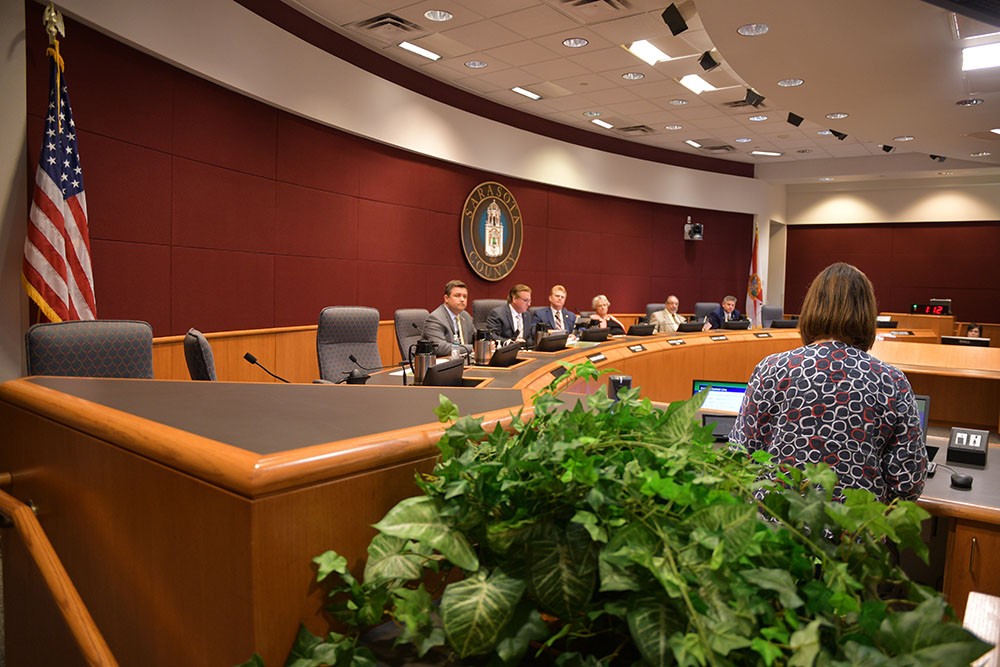After Public Resistance, County Commission Moves Forward with Redistricting
Government
SRQ DAILY WEDNESDAY PHILANTHROPY EDITION
WEDNESDAY NOV 20, 2019 |
BY JOHN WITTE
The chamber was already full at 8:50am, and the spillover room wasn’t far behind. Half the community organizations in Newtown turned out for Tuesday’s meeting, and a few of them were protesting outside. A crowded commission meeting, of course, is not terribly unusual for Sarasota, but this felt different: when public comments commenced, the first civilian to approach the microphone was Vice Mayor Freeland Eddie. On behalf of Sarasota’s unanimous City Commission, Freeland Eddie presented a scathing critique of the County’s voter redistricting plan, including a denunciation of the discriminatory effects that the new voter districts might have. The City Commission strongly recommends that the County consider waiting until the 2020 census to redraw the voting districts. She’s the first person to speak out, but certainly not the last. A former Sarasota circuit court judge claims that the commission has no legal requirement to redraw the districts before the census. Several members of the community complain about the lack of a sidewalk on Myrtle Street (the only way to get to Newtown’s Booker High School). They want representation on the County Commission. President of Sarasota’s Democratic Black Caucus Dee McFarland points out that redrawing the districts now would preemptively end the electoral campaign of Fredd Atkins, the former Mayor and North Sarasota candidate who's currently running to be a commissioner. “There are already candidates declared in these races,” she says. Head of the local NAACP, Trevor Harvey mirrors her sentiments. One Newtown resident, exasperated, asks “I don’t understand. What’s the problem you have with North Sarasota?”
The controversy, if you haven’t been following the local coverage, is around the unpopular new maps developed by a consulting firm called Spitzer and Associates, at the behest of the County Commission. The second map in the initial presentation, the genealogy of which is still found in both map 4 and map 4.1, places 10,000 residents from a heavily Republican precinct into District 1, which includes Newtown and several of Sarasota’s colleges. The effect of this shift is to transform the voting district which includes Sarasota’s largest black and Latino populations from moderately Democratic to moderately Republican. Not only that, but the map was submitted anonymously by Bob Waechter (who was charged with election tampering in 2012), and that fact was only revealed after it was discovered by the public. Even the population estimates that the maps are based on have suffered repeated criticism—they’re based solely on property appraisal data, as no census data was available. In short, the process of redrawing the voting district maps has not been well received by the public.
Perhaps the most shocking public comment came from the independent scholar and activist R.N. Collins, the man responsible for deflating the methodology of the county’s first population count. If the legal case for redrawing the district maps is based on the idea that the population distribution of the county has changed more than 10 percent, he has serious doubts that the population data provided by Spitzer and Associates is any more accurate than the 2010 Census. In fact, he claims, they didn’t even take into account any data after the year 2016. SRQ verified his claim with data provided by the original statistician hired by Spitzer and Associates. That statistician, Richard Doty, confirms with SRQ that “If the property appraiser’s data was missing some of the newest construction, we have no control over that and there was insufficient time to redo this work with more recent data. But new construction only reflects a portion of the growth since 2010.”
Public comments continue for over three hours. At the end, the Commission decides to move forward with map 4.1, with a 3-2 vote in favor. With a laugh, Nancy Detert asks Kurt Spitzer of Spitzer and Associates whether the redistricting process ever ends in anything other than a lawsuit. In his experience, lawsuits are actually fairly rare. When asked by SRQ about his plans, the NAACP’s Trevor Harvey responds that “we have to figure what the next steps are for us as a community. Some of those approaches may be filling some sort of litigation, but it’s a conversation that still needs to happen.”
« View The Wednesday Nov 20, 2019 SRQ Daily Edition
« Back To SRQ Daily Archive









